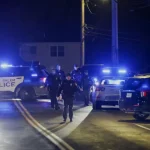

The House and Senate are set for a collision course when it comes to appropriations this year, and Speaker Kevin McCarthy (R-CA) is in the middle of it, having to please the far-right fringe of his conference while also ensuring the government is funded before the Sept. 30 deadline.
Senate appropriators appeared at-odds over the spending caps set in the debt ceiling deal, but now the House is marking their appropriations bills below those caps—prompting more concerns.
NEW JERSEY SUES OVER NEW YORK CITY CONGESTION PRICING PLAN
But, there is not much else McCarthy is able to do, as he attempts to meet the demands of some of the most conservative members of his caucus who want to see the government significantly slash spending.
Earlier in July, 21 Republicans signed onto a letter threatening to vote against appropriations bills if they didn’t meet a list of their demands. Included in that list was all appropriations measures enacted at fiscal 2022 levels “without the use of reallocated rescissions to increase discretionary spending above that top-line.”
This places the House up against the Senate, who are displeased with the caps set in the debt ceiling bill, and have started marking-up appropriations bills above those caps.
Senate Appropriations Committee Chairwoman Patty Murray (D-WA), announced her and ranking member Susan Collins’s (R-ME) deal to add $8 billion for defense, and $5.7 billion for nondefense emergency funds during a committee markup last week.
“Let’s be clear: Emergency spending does not break the debt limit agreement,” Collins said. “The law allows for funding to be designated as an emergency and for other adjustments, for program integrity, wildfires suppression, and disaster relief funding.”
But, members of the House Republican Conference are unlikely to see it that way as they are adamant about cutting spending.
“I think that it makes sense for us to continue looking at other ideas on how you can further achieve savings,” said Rep. Garret Graves (R-LA), an ally of McCarthy. “You’ve seen dating back to immediately after the FRA to where Senate was out there talking about more spending, meaning going above the debt ceiling statutory caps, and I think it’s really important that we have a solid House position to put this country on a better sustainable financial trajectory.”
“The speaker doesn’t have a desire to go to a CR, and it’s why we’ve tried to move these appropriations bills through the process,” Graves also said last month.
CLICK HERE TO READ MORE FROM THE WASHINGTON EXAMINER
With just one week before the August recess to pass appropriations bills, there isn’t much time for fighting between the chambers, who must pass appropriations bills before the end of September.
The other alternative would be a continuing resolution — a short-term stop-gap measure that extends government funding at the prior year’s rate — to give Congress more time to negotiate.





